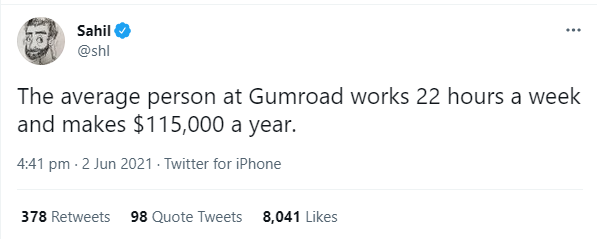The Average Person at Gumroad Works 22 Hours a Week and Makes $115k a Year
Jul 23, 2021
Sahil isn’t your typical founder.
He was only 19 when left Pinterest to create Gumroad in 2011. Within a year he had raised $8m and truly believed he could make his company a unicorn.
But he failed.
His company went from 23 employees all the way back down to one person. This crushed Sahil but he didn’t give up.
Today, Gumroad is still alive and unlike most unicorns, it’s making a profit every month. This is impressive in itself but what amazed me was this is all without having a single full-time employee. They all work part-time yet have a mean salary of $115k and a median of $100k!

It sounds too good to be true so I had to dive in deeper.
Freedom at all costs
Gumroad has no meetings and no deadlines.
It wasn’t born out of ideological purity but necessity because Sahil was burnt out. VC expectations in the early years had taken their toll. He wanted to work as little as possible so couldn’t demand long hours of others while he took painting and writing classes.
As a former technology consultant, I couldn’t imagine Gumroad’s system working in practice but it does.
They use Notion to manage their workload and people can pick whatever task they want from the queue. Features go live when they are ready not according to an arbitrary go-live date. Again, this is music to a former consultant’s ears.
They communicate with each other through comments and people only need to check their messages once a day. New joiners are even asked to turn off all notifications from their phones!
Almost everyone I know in the tech world is glued to their devices to check their emails and messages. It’s refreshing to know you don’t have to reply within minutes to prove you are working hard enough.
Single mission
“Make our creators more money” — Sahil
Gumroad is a marketplace where creators can sell products such as e-books securely. Some of the top users make hundreds of thousands of dollars per year.
The only reason Gumroad’s bizarre system works is that people who work there only need to care about is one thing. This is how to enable the users to make more money. The more money creators make, the happier they are and the more they evangelize.
There are no targets plucked from thin air to meet promotion criteria. Gumroad trusts everyone to use common sense and not endanger the brand.
They’re allowed to choose projects because they would be fun even if there are higher priority items. The belief is when a developer builds something they want to build, it’s going to be of higher quality.
The singular focus on making creators happy has led to some of the top creators coming on board to work for Gumroad. It makes perfect sense. The most successful creators are the company’s biggest fans and know the product intimately.
Daniel Vassallo became the Head of Product.
Randall Kanna became the Head of Community.
Philip Kiely became the Head of Marketing.
The best part is they only committed to 10 hours per week!
The downsides
If Sahil and is reading this and reaches out to hire me, I can’t deny I would struggle to say no. Yet there are downsides to his unconventional system too, which he acknowledges.
No social life
The stereotypical developer is an introvert who loves the idea of not needing to talk to. Not everyone fits the mold though. Many, like me, enjoy interactions with our colleagues. Social events and working in a team helps to make us feel like we belong but this isn’t part of life at Gumroad.
The low time commitment means you could fill the rest of your time with social activity to compensate. Whether it balances out is an individual thing for each person.
Hourly pay
Working for Gumroad differs from a traditional job in many ways. People must track their hours and get paid only for the hours they work. There’s no health insurance or other perks alongside the role. It’s great if you’re already of an entrepreneurial mind but lacks the stability you might want.
There’s an anti-overtime rule in place where your hourly rate is cut in half if you work more than 20 hours per week. While great to prevent burnout, if you need extra money or are fascinated by a piece of development, you lose out.
Lack of promotion opportunities
Gumroad is intentionally lean. If there are no teams and most people work on individual projects then there are fewer opportunities to take on new roles. This suits developers who don’t want to manage others but limits those who do.
Many people working with Gumroad are founders or creators in their own right. For them, it’s an income stream where they can work on a project they believe in while they build their own startup on the side.
Is this the future of work?
Gumroad’s model is extremely successful and an interesting case model for other tech startups.
As we can see from the downsides, it’s not for everyone but I’m sure it’s exciting for many people reading. You could earn enough money to live comfortably and fill your time with leisure or use it to build your own startup.
The increased focus on remote work in the post-Covid era means the time is ripe for startups to experiment. Gumroad has proved a hybrid model with high compensation and low hours is possible. I predict other like-minded founders will install similar systems inspired by them.
All the information in this article came from Sahil’s writing directly and he’s transparent about his processes. If I’m ever in the position where I can hire people, I’m going to rereading his outlines to mimic his system.
It feels like the future.

